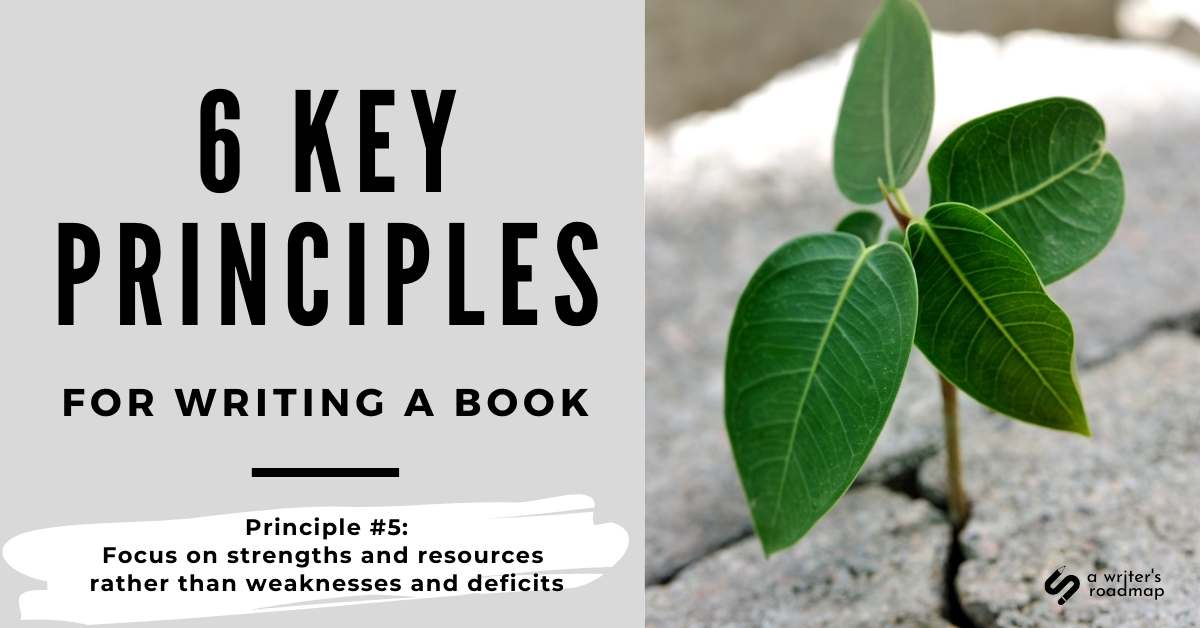- No single approach works for everyone
- The simplest and least invasive approach is frequently the best
- The solution and the problem are not necessarily related
- Change is happening all the time
- Focus on strengths and resources rather than weaknesses and deficits
- Focus on the present, rather than the past or future.
“It is much more valuable to look for the strength in others. You can gain nothing by criticizing their imperfections.”
Daisaku Ikeda
I’d extend this to include ourselves.
And that brings us to …
Principle #5: Focus on strengths and resources rather than weaknesses and deficits
This principle is a game-changer, because it balances you out.
The human tendency is to be alert to what might go wrong. Not just in our environment, but in our goals and dreams and how we see ourselves. That last one’s a real kicker–the old superego can really get in our faces and wag its bony finger, pointing out what’s wrong with us SPECIFICALLY.
Yes, there are optimists among us. No doubt some of them are writers!
But the self-help industry is worth bazillions for a reason. The current version of humans is still wired to be alert to dangers before emerging from the cave to enjoy the view. Many of us are bent on improving our lives when we feel like something isn’t working.
So when I suggest it’s good to focus on strengths and resources, what I mean is to focus on giving your strengths at least equal weight to your weaknesses, and your resources at least equal weight to your deficits.
Then you’re balancing the situation, aligning it with reality.
In fact, I suggest that regardless of whether you’re writing your first book or your tenth, just blind yourself to the obvious challenges, which are (lest we forget!):
- writing well takes skill
- you learn how to write by writing
- nobody cares if you write
- it can be tough to get traditionally published
Let’s hear about your strengths!
For example, here are mine:
I’m ridiculously persistent. Sometimes that’s good for me, sometimes it’s bad for me. Around writing, I see it as a strength.
Let’s see, what else? I type quickly. Today I type 99 wpm. (I just tested my speed here on typing.com, which was fun but also a bit nerve-wracking.) Back in the day, my top speed was 115 wpm.
I read a lot. You might say I’m a compulsive reader. This gives me a ton of exposure to well-written books.
My day job (book editing) is intensive training for understanding the craft elements that go into great writing.
I get lots of ideas and I like thinking about them.
Acknowledge your resources!
For example, here are mine:
I have two working laptops, an internet connection, and subscriptions to various software.
I have the money to buy dollar store notebooks and index cards whenever I want to.
Running a business means I can write off the cost of pens!
I know lots of writers, some of whom give me feedback on my stuff (or would if I asked them to).
Balancing the Ledger
What about weaknesses and deficits? I’m suggesting you don’t even go there. You already know what they are. Unless you’re actually problem-solving your way out of a weakness or deficit, just put them out of your mind and focus on your strengths.
Focus on the fact that you are ready, willing, and able to write.
Save your problem-solving for the page!
As Dorothea Brande suggested back in 1936, “Proceed as if you cannot fail.”
Next up: Principle #6
Focus on the present, rather than the past or future.
If you don’t want to miss this KEY PRINCIPLE, I hope you’ll sign up for the Thursday Postcard!

